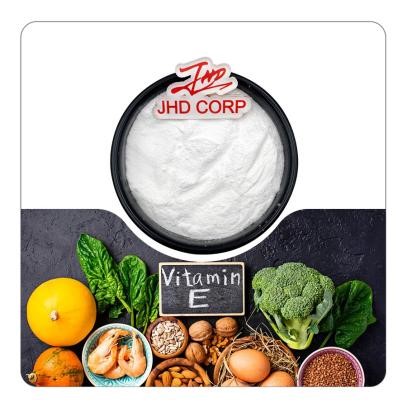Welcome to JHD Nutrasource!
Shop
Vitamin E
Vitamin E is a fat-soluble vitamin that includes a group of eight compounds, often referred to as tocopherols and tocotrienols, with alpha-tocopherol being the most biologically active and prevalent form in the human diet. It is renowned for its antioxidant properties and plays a crucial role in various biological processes.
Description
| Product Name | Vitamin E |
| Appearance | White powder |
| Specification | 50% |
| Test Method | HPLC |
| CAS No | 2074-53-5 |
| MF | C29H50O2 |
| Certificate | FSSC/cGMP、ISO、HACCP、Kosher、HALAL |
Functions
Antioxidant Activity: It neutralizes free radicals, reducing oxidative stress and helping to prevent cellular damage.
Skin Health: Supports skin health by protecting against UV damage and promoting skin repair.
Immune System Support: It supports immune function by maintaining the integrity of immune cells.
Neurological Health: It has been linked to reduced risk of cognitive decline and may support brain health.
Cardiovascular Health: Some studies suggest it may help prevent cardiovascular disease by reducing inflammation and preventing blood clots.
Applications
Dietary Supplements: Vitamin E is commonly sold as a dietary supplement to ensure adequate intake, especially for those with limited dietary sources.
Topical Skin Products: It is used in skincare products for its potential to reduce signs of aging, protect against sun damage, and improve skin texture.
Food Fortification: Added to various food products to enhance their nutritional value and extend shelf life.
Pharmaceuticals: Used in certain medications, particularly those aimed at treating conditions related to oxidative stress.
Cosmetics: Incorporated into cosmetics for its antioxidant properties and potential skin benefits.
Agriculture: Sometimes used in agriculture to enhance the shelf life and appearance of fruits and vegetables.

